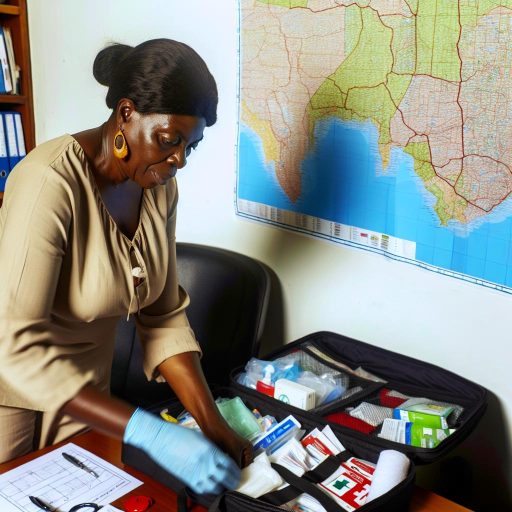Role of Health Educators in Disease Prevention
Health educators play a crucial role in promoting healthy behaviors and preventing diseases through education, advocacy, and community outreach.
Importance of Disease Prevention in Public Health
Disease prevention is essential in improving the overall health of communities, reducing healthcare costs, and increasing quality of life.
By educating individuals about preventive measures such as vaccinations, healthy eating, exercise, and regular screenings, health educators empower people to make informed choices about their health.
Duties of Health Educators
As health educators, our role is crucial in promoting overall well-being and preventing various diseases within communities.
In order to effectively fulfill our duties, it is essential to understand the key responsibilities that come with this profession.
Educate communities on disease prevention methods
One of the primary duties of health educators is to disseminate valuable information about disease prevention strategies to the public.
This involves conducting workshops, seminars, and awareness campaigns to educate individuals on proper hygiene practices, nutrition, exercise, and other preventive measures.
Develop and implement health education programs
Health educators are tasked with creating comprehensive health education programs tailored to the specific needs of different populations.
These programs are designed to raise awareness about common health issues, promote healthy behaviors, and empower individuals to take control of their own well-being.
Collaborate with healthcare professionals and community organizations
Collaboration is key in the field of health education.
Health educators work closely with healthcare providers, public health agencies, non-profit organizations, and other community stakeholders to coordinate efforts and maximize the impact of disease prevention initiatives.
By partnering with various entities, we can leverage resources and reach a larger audience with our health promotion messages.
Health educators play a crucial role in disease prevention by utilizing their skills and knowledge in various ways.
Skills Required
- Knowledge of public health principles.
- Strong communication and teaching skills.
- Ability to develop culturally sensitive programs.
Health educators must have a solid understanding of public health principles to effectively design and implement disease prevention programs.
With strong communication skills, health educators can effectively convey important health information to individuals and communities.
Furthermore, their teaching skills enable them to educate people on disease prevention strategies and proper health practices.
Developing culturally sensitive programs is essential for health educators to reach diverse populations and address their specific needs.
By understanding different cultural norms and beliefs, health educators can tailor their programs to resonate with various communities.
Moreover, culturally sensitive programs help build trust and rapport with the target audience, leading to better outcomes in disease prevention.
Health educators also need to be creative and innovative in their approach to designing programs that are engaging and effective.
Transform Your Career Today
Unlock a personalized career strategy that drives real results. Get tailored advice and a roadmap designed just for you.
Start NowUtilizing various educational tools and techniques, they can create interactive and impactful initiatives to promote disease prevention.
In addition, health educators should stay informed about the latest research and developments in public health to ensure the accuracy and relevance of their programs.
By staying up-to-date with advancements in the field, they can incorporate evidence-based practices into their disease prevention efforts.
Collaboration with other healthcare professionals and organizations is another important aspect of the health educator’s role in disease prevention.
Working together with stakeholders in the community, they can coordinate efforts to address health disparities and promote wellness among diverse populations.
Networking and building partnerships with community leaders, healthcare providers, and other stakeholders help health educators expand the reach and impact of their programs.
By fostering these relationships, they can pool resources and expertise to create comprehensive and sustainable initiatives for disease prevention.
Health educators play a vital role in disease prevention by utilizing a combination of skills and knowledge to design, implement, and evaluate effective programs.
Their ability to communicate, teach, and develop culturally sensitive initiatives is essential for addressing public health challenges and promoting wellness in communities.
Delve into the Subject: How Adoption Counselors Prepare Families for Adoption
Impact on Disease Prevention
Health educators play a crucial role in increasing awareness of disease risk factors.
By educating the public on healthy lifestyle choices, they empower individuals to make informed decisions.
This proactive approach helps reduce healthcare costs associated with preventable diseases in the long run.
Benefits of Increasing Awareness of Disease Risk Factors
Identifying risk factors early allows individuals to take preventive measures to avoid developing diseases.
This knowledge enables people to make necessary lifestyle changes to promote overall well-being.
Health educators help individuals understand the importance of regular screenings and check-ups for early detection.
Promotion of Healthy Lifestyle Choices
Health educators provide guidance on nutrition, exercise, stress management, and other health-promoting behaviors.
Encouraging individuals to adopt healthier habits reduces the likelihood of developing chronic diseases.
Education on the benefits of physical activity and proper nutrition empowers individuals to take control of their health.
Reduction of Healthcare Costs
Preventing diseases through education and awareness leads to a decreased burden on the healthcare system.
Transform Your Career Today
Unlock a personalized career strategy that drives real results. Get tailored advice and a roadmap designed just for you.
Start NowBy focusing on preventive measures, health educators help lower the costs associated with treating preventable illnesses.
Investing in disease prevention initiatives can result in significant savings for both individuals and healthcare providers.
The role of health educators in disease prevention cannot be understated.
Their efforts in increasing awareness of disease risk factors, promoting healthy lifestyle choices, and reducing healthcare costs have a profound impact on the well-being of individuals and the community as a whole.
By empowering individuals to take charge of their health, health educators contribute to a healthier and more sustainable future.
Learn More: Addressing Social Skills in Life Skills Instruction
Challenges Faced by Health Educators
Health educators play a crucial role in disease prevention by promoting healthy behaviors and providing information to communities.
However, they encounter various challenges in their work that hinder the effectiveness of their programs.
Limited funding for health education programs
One of the major challenges that health educators face is the lack of adequate funding for their programs.
Without sufficient financial resources, it becomes difficult to reach a wide audience and implement effective health promotion strategies.
This limited funding often leads to a shortage of staff, inadequate training, and restricted access to necessary materials and resources.
As a result, health educators may struggle to develop comprehensive programs that address the specific needs of the target population.
To overcome this challenge, health educators must advocate for increased funding from government agencies, non-profit organizations, and other stakeholders.
They can also seek out grants and partnerships to support their initiatives and expand their reach within the community.
Overcoming cultural barriers to health promotion
Another significant challenge for health educators is overcoming cultural barriers that may hinder the adoption of healthy behaviors.
Cultural beliefs, practices, and traditions can influence attitudes towards health and wellness, making it difficult to promote behavior change.
For example, certain cultures may have specific dietary preferences or religious beliefs that conflict with mainstream health recommendations.
Health educators must be sensitive to these cultural differences and tailor their messaging to resonate with diverse populations.
Engaging with community leaders, cultural organizations, and local influencers can help health educators bridge the gap between different cultural perspectives and promote health behaviors effectively.
By building trust and understanding, they can overcome resistance to change and encourage positive health outcomes.
Transform Your Career Today
Unlock a personalized career strategy that drives real results. Get tailored advice and a roadmap designed just for you.
Start NowAddressing misinformation and misconceptions about diseases
Misinformation and misconceptions about diseases can pose a significant challenge for health educators in their efforts to prevent illness and promote wellness.
Inaccurate information spread through social media, word of mouth, and other channels can undermine public health initiatives and erode trust in healthcare providers.
Health educators must actively combat misinformation by providing reliable, evidence-based information to the community.
This requires effective communication strategies, including clear messaging, engaging visuals, and interactive activities that educate and empower individuals to make informed decisions about their health.
Collaborating with healthcare professionals, public health agencies, and community organizations can help health educators amplify their message and reach a broader audience.
By working together to dispel myths and clarify misconceptions, they can build a foundation of knowledge and understanding that supports disease prevention efforts.
You Might Also Like: The Future of School Social Work: Trends and Predictions

Health educators play a crucial role in disease prevention by implementing effective strategies that promote health education and awareness.
Here are some key strategies for success:
Utilize social media and technology for health education outreach
- Create engaging content on social media platforms to reach a wider audience and disseminate important health information.
- Utilize technology tools such as mobile apps and online resources to provide easily accessible health education materials.
- Collaborate with digital influencers and online communities to amplify the message and increase engagement.
Collaborate with local healthcare providers and community leaders
- Build partnerships with local clinics, hospitals, and healthcare organizations to enhance the reach and impact of health education programs.
- Work closely with community leaders and stakeholders to address specific health needs and tailor education programs accordingly.
- Organize joint events and workshops with healthcare providers to deliver comprehensive health education services to the community.
Monitor and evaluate the effectiveness of health education programs
- Establish clear goals and objectives for health education programs to track progress and measure impact.
- Implement data collection and evaluation methods to assess the effectiveness of education strategies and identify areas for improvement.
- Collect feedback from participants and stakeholders to continuously refine and adapt health education initiatives for better outcomes.
By incorporating these strategies into their work, health educators can maximize their impact in disease prevention and promote healthier communities.
Find Out More: Key Qualities of Effective Disability Services Coordinators
Health Educators and Disease Prevention
Health educators play a vital role in disease prevention by educating individuals on healthy behaviors.
They emphasize the importance of preventive measures such as regular exercise and healthy eating habits.
Through ongoing education and outreach efforts, health educators empower communities to make informed health choices.
They provide essential information on disease prevention strategies, early detection, and access to healthcare services.
Health educators help in reducing the burden of preventable diseases and promoting overall well-being in society.
Continued professional development and training are crucial for health educators to stay informed about current health trends.
By actively engaging with the public, health educators can address health disparities and improve health outcomes in communities.
The key role of health educators in disease prevention is to educate, empower, and advocate for healthier lifestyles.
Their dedication to promoting public health through education and outreach efforts is essential for disease prevention.
Transform Your Career Today
Unlock a personalized career strategy that drives real results. Get tailored advice and a roadmap designed just for you.
Start NowAdditional Resources
WHO EMRO | Health promotion and disease prevention through …
Health Education Workforce: Opportunities and Challenges
[E-Books for Sale]
The Big Book of 500 High-Paying Jobs in America: Unlock Your Earning Potential
$19.99 • 500 High-Paying Jobs • 330 pages
Explore 500 high-paying jobs in America and learn how to boost your career, earn more, and achieve success!
See All 500 High-Paying Jobs of this E-Book
1001 Professions Without a Degree: High-Paying American Jobs You Can Start Now
$19.99 • 1001 Professions Without a Degree • 174 pages
Discover 1001 high-paying jobs without a degree! Unlock career tips, skills, and success strategies for just $19.99!




